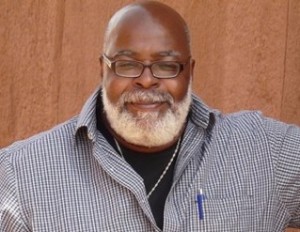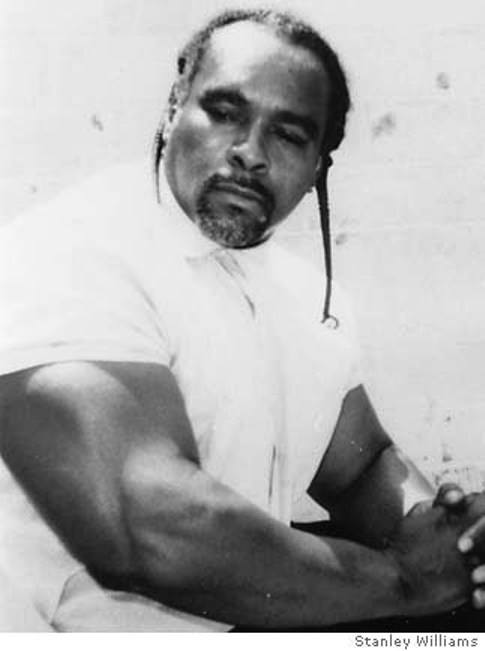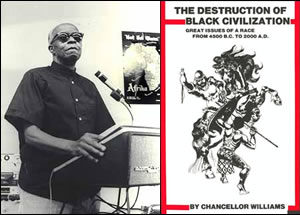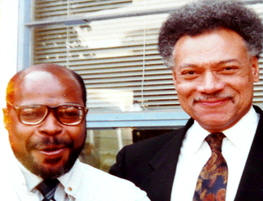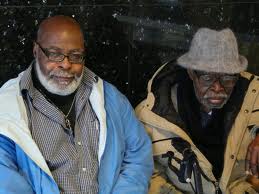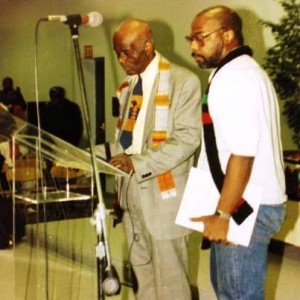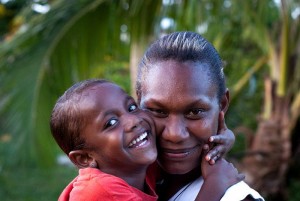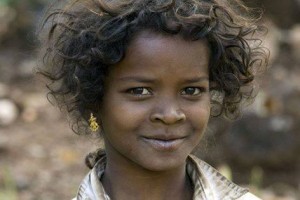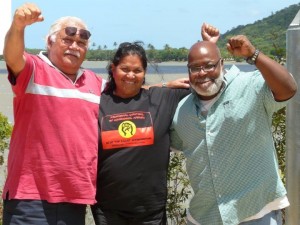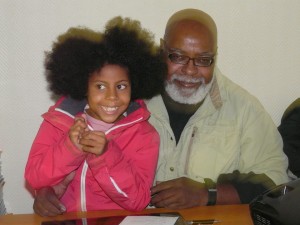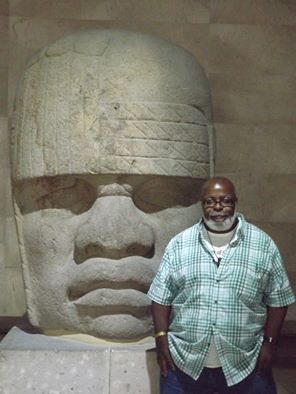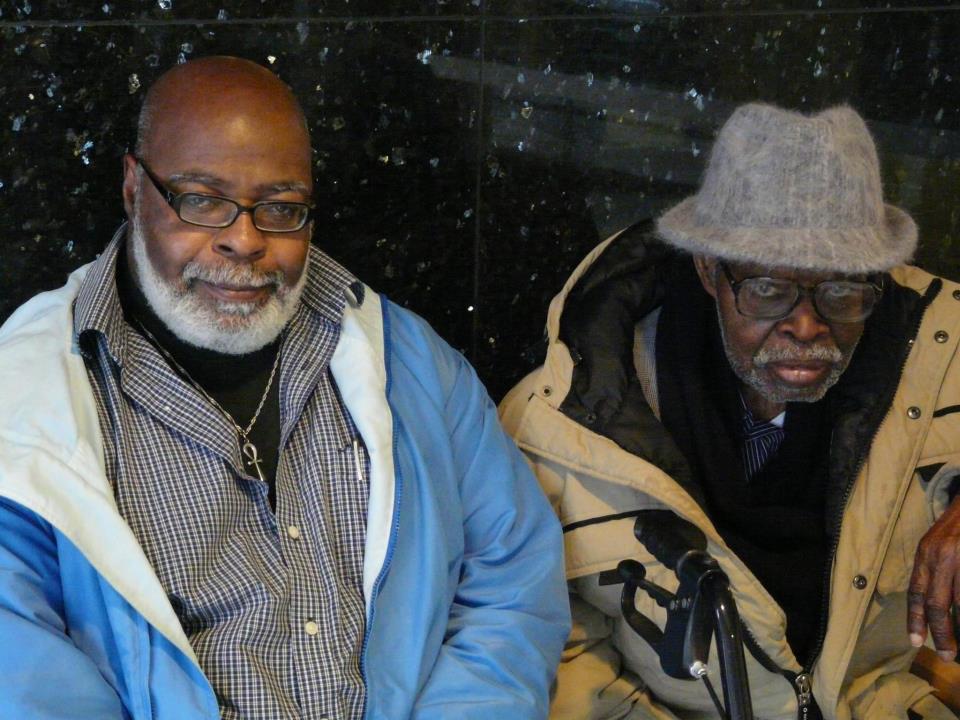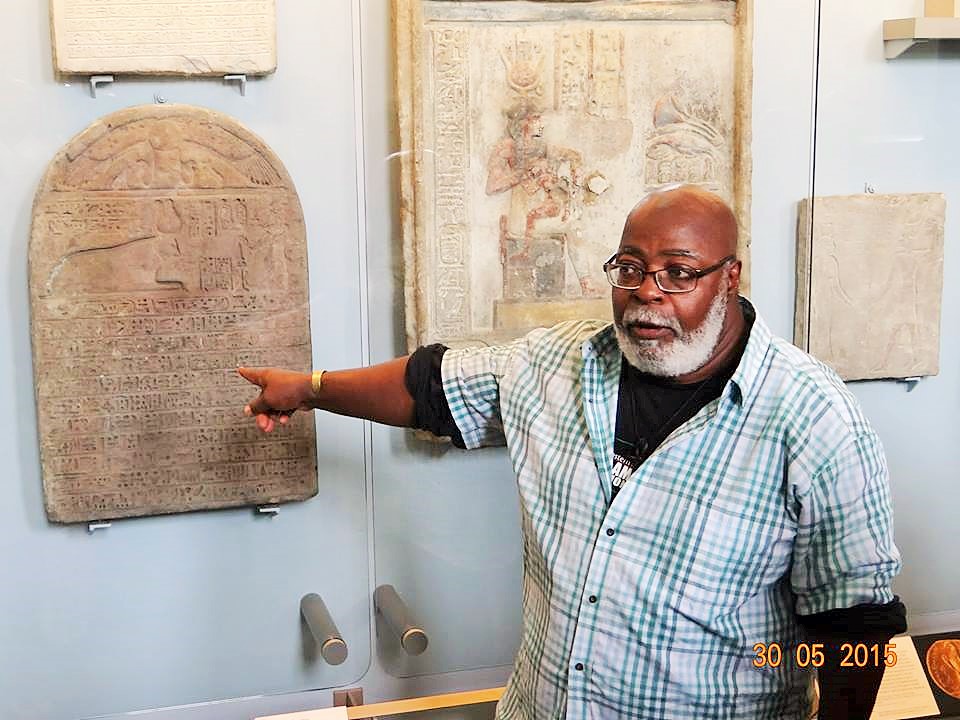This February Kentakepage on Facebook (www.facebook.com/kentakepage) recognized 28 Brilliant Scholars Who Connect us to our Past and was honored with an exclusive interview with Baba Runoko Rashidi.
Dr. Runoko Rashidi, historian, research specialist, writer, world traveler, and public lecturer has been educating our people on the African foundations of world civilizations for 41 years.
Born in 1954 and raised in South Central Los Angeles, Dr. Rashidi grew up during the Black Power Movement. The end of the civil rights movement, the turmoil and trauma of the U.S. involvement in the Vietnam War instilled in him a desire to make the world a better place.
Tookie Williams
“I grew up with one of the co-founders of the Crips, Tookie Williams. There’s an interesting story… We interacted a few times at school, not much, and 20 years later after I had established myself as an historian, I began to get correspondence and interest came my way by a group of people on death row, convicted of multiple murders and one of them was Tookie Williams and two other former members of the Crips. They had written a book on African history on death row and I ended up editing that book. So, Tookie and I developed a very different relationship. Now this tough as nails Brother would sometimes call me and virtually cry on the phone-not that he was afraid to die- I don’t think he was afraid of very much, but he was so frustrated that it took him so long in life, almost to the point that he couldn’t do anything with it, to learn something about the value of history. I grew up, in a sense, fortunate.”
His love for Black people was cultivated early when he read some of the history of Marcus Garvey and heard the speeches of Malcolm X. He had always liked to read study and go to the library and had a good memory for dates and facts; however all that was needed was a spark. The spark came at the age of 18 when Dr. Rashidi read The Destruction of Black Civilization by Chancellor Williams. That book, he says put him on his path as a historian.
Dr. Rashidi told Kentakepage:
“At an early age, I realized that based on my background, personality and interests that history was a way that I could do that. For the last 41 years I haven’t looked back.”
His family was supportive, however not always understanding of his passion. They did make it possible for him to ply his craft by loving him as a brother and son.
Dr. Rashidi went to public school in Los Angeles, but joined a study group and then went to California State University at Northridge. He briefly studied anthropology and archeology at U.C.L.A. taking a class here and there from time to time.
In 1981, Dr. Rashidi met his major scholarly influence: Dr. Ivan Van Sertima, who was the leading authority in the world on the African Presence in pre-Colonial America and the founder of the Journal of African Civilization.
Runoko Rashidi and Ivan Van Serima
The two of them hit it off and Dr. Rashidi put himself under his wing, writing with him. He said of his relationship with his mentor and teacher,
“I think he respected me, he respected my energy and zeal. I was a hard worker. I really believed in this mission and that was a big influence.”
Dr. Rashidi also worked and was influenced by such notable scholars as Dr. John Henrik Clarke and Asa Hilliard and traveled with Dr. Josef ben-Jochannan.
With Josef Ben-Jochannan With John Henrik Clarke
He recalled his 1st experience visiting Africa:
“You can’t put it into words. It was a tremendous experience. The 1st place I went to was Egypt. I’ve been to 28 countries in Africa and Egypt was the 1st place. Seeing those pyramids and wandering through the Valley of the Kings, the Karnak Temple, the Luxor Temples, the Step Pyramids at Saqqara… you have to pinch yourself and tell yourself could human beings have done this? Could my ancestors have done this? I remember after my first trip to Egypt, I came back and gave a presentation and it seemed to me that I could actually levitate off the ground! I was so high from the Knowledge of Self that just reinforced all the good things that I’ve ever wanted to feel about myself.”
The name Runoko Rashidi was given to him when he was 18 or 19 years old. The name Runoko comes from the Shona community in Zimbabwe and means handsome and Rashidi is Kiswahili, from Tanzania meaning counselor or teacher. He also has another name: Okalo.
“My name is very Pan-African… In northern Uganda, I visited a war zone and gave out some school supplies at a local school and the people were so happy that they game me another name, Okalo and that means, he who brings or he who gives. So, my name means the handsome teacher who brings gifts.”
Dr. Rashidi has shared those gifts in 57 different countries now for over 40 years and is driven by a passion and love for Black or African people.
“I think you have to be driven. You have to have a passion. You have to have a fire. John Henrik Clarke used to say if we see something in our children at a young age, we need to develop and nurture that and when I see those tendencies in other people I tend to want to do that. At this point in my life, that’s a big deal to me: To try to find younger people who want to do something similar and hopefully he can go beyond what I’ve done. Every generation builds on the success’ on the generation that came before and they can in turn pass it down to generations to come. For me I feel like people like Carter G. Woodson and the great historian J.A. Rogers, Chancellor Williams are still alive… They are alive in me because I am them. I think I am doing the work they did and there will be others to do the work that I’ve done.”
Dr. Rashidi is not content with simply duplicating the work of his teachers rather he also feels the hallmark of a good teacher is when their students can bring something new to the table and add to their work.
This he has done by giving the world unprecedented documentation of the African presence in Asia, the Pacific Islands and Australia.
Mother and child in Melanesia Adivasi girl in India
“There was a branch of the Garvey movement in Australia and a Black Panther Party. These are fascinating things. In fact Marcus Garvey had planned on visiting Australia in 1924 before he was railroaded by the FBI. You have Black people throughout Melanesia like Fiji and Bougainville and the Buka Islands in Papa New Guinea who have told me personally, “We come from Africa!” There is no question about that. None of this has really been dealt with effectively from the perspective of Pan-Africanism. So one of the things that I’ve really wanted to do; that I’ve tried very hard to do is to look at Black populations around the world before enslavement.”
Runoko Rashidi in Australia
Dr. Rashidi also feels strongly that Africans must see their history beyond the confines of slavery.
“One of the worst crimes you can commit is to teach a child that his history begins in slavery and colonization and a lot of us believe that. Black History Month comes around and we talk about North American Heroes and Sheroes who come out of the enslavement period. That’s good to talk about that, especially resistance to enslavement and not just African people being victims, but to look at those hundreds of millions, at least tens of millions, of Black people in Asia, Australia and the Pacific whose story has not been told for the most part from an African perspective. The revolt of Africans in Southern Iraq of 1868-1883, which may well make that the biggest sustained revolt of enslaved people in human history. It’s called the Revolt of the Zanj. Africans taken from East Africa, the Horn of Africa, who worked on the salt marshes of southern Iraq, who revolted and marched on Baghdad. Some of them were never defeated. So if we are going to talk about enslavement, let’s talk about those Africans who fought day and night to maintain their basic sense of humanity. Who fought to keep their families together, who fought to maintain their human dignity in spite of all odds. Now that I think is inspiring.”
There have been detractors and critics from all races; however he accepts and even welcomes the challenges involved in teaching Black people despite the criticisms.
“Sometime that criticism can be a very positive thing. If we aren’t prepared to have our work challenged and meet that challenge, than sometimes the work doesn’t grow and you have to be up to the task.”
Along with criticism, Dr. Rashidi as an historian must also battle the flood of misinformation, myths and indifference involved with Black history, including: Africa being named after Scipio Africanus, the Aboriginal people of Tasmania being wiped out and Africa being a country rather than a continent.
A Tasmanian – “Another myth would be, that the Aboriginal people of Tasmania were wiped out. I feel a little bit responsible for that because I think I’ve written more about the Black presence in Tasmania than any other living person, any Black person anyway. Then I went to Australia, I went to Tasmania and I interacted with those Sisters and Brothers and they are actually deeply offended when people suggest that they were all exterminated. What happened was, Tasmania, being an island off the south-east coast of Australia was established as a British prison cell in about 1802 and toward the end of that period, and maybe not even toward the end of it, white seal hunters captured them and used them as sexual slaves and children were born from those unions.”
He is fully aware that the battle will be hard fought.
“It takes work. It takes the willingness to do a little research to go beyond YouTube, to go beyond Wikipedia, to be able to look at multiple sources… I just think we have to put as much solid information out there as we can and to encourage people to research and to check it out.”
“I think really at the root of it is instilling for people a desire to know. We have to find very creative ways in instilling a desire to want to know. One of the ways I do that when I get the opportunity is by using a lot of visuals. And a lot of people respond to the visuals in addition to the texts.”
Dr. Rashidi continues to lecture and tour the world. He also offers online courses on the global African presence and is organizing tour groups to Spain, Morocco, Nigeria and Cameroon.
In the midst of his busy schedule, Dr. Rashidi frequently takes time to acknowledge the glory and greatness of the Black woman. He has a daughter and has been married twice before and hoping to get married at least one more time to a Black woman.
“I love Black women. They play a role in history that far outshines their counterparts of other ethnic groups. My mother was a Black woman… We as Black men have a duty to try and lift them up. We need them to lift us up. We need each other. The Black family is in crisis so we need each other desperately and every time I get an opportunity to raise that issue, I’m going to do it.”
Dr. Rashidi believes it is the responsibility of Africans to document and tell our own history and not wait on the descendants of the slave-masters or colonizers to do it.
“That just doesn’t make any sense at all. That’s the reason for me doing what I do. What I do might be summed up in a statement that a Brother gave me in Ghana and it goes, ‘What you do for yourself depends on what you think of yourself and what you think of yourself depends on what you know of yourself and what you know of yourself depends on what you have been told.’ That’s very profound and that’s my philosophy of history. If you think you come from nothing, you will act that out. But if you think you have a great history… then I think you’ll act that out too. That’s what we are trying to get our people to do: Act out the greatness that we have in our historical tradition.”
For more information on the work of Runoko Rashidi visit: www.travelwithrunoko.com. He can be found on Facebook at www.facebook.com/runoko.rashidi and www.facebook.com/pages/Global-African-Presence/259947771814


